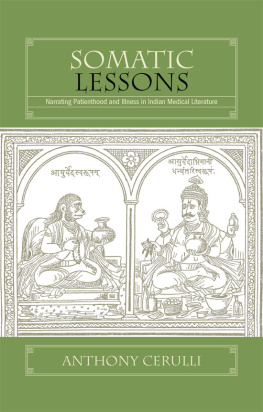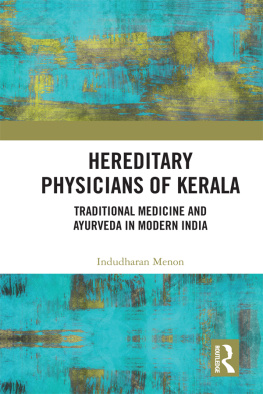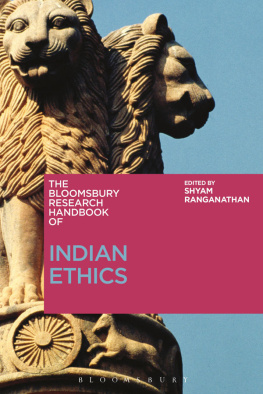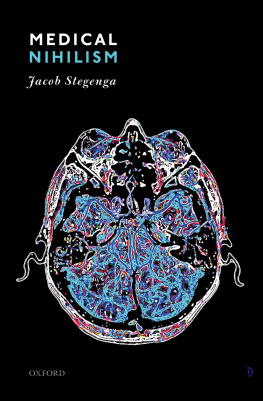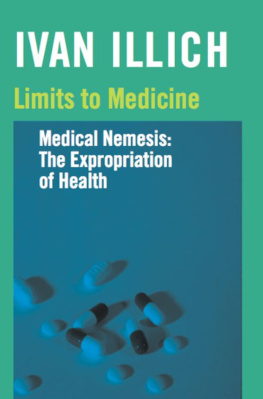Cerulli - Somatic Lessons: Narrating Patienthood and Illness in Indian Medical Literature
Here you can read online Cerulli - Somatic Lessons: Narrating Patienthood and Illness in Indian Medical Literature full text of the book (entire story) in english for free. Download pdf and epub, get meaning, cover and reviews about this ebook. City: Albany, India, year: 2012, publisher: State University of New York Press, genre: Religion. Description of the work, (preface) as well as reviews are available. Best literature library LitArk.com created for fans of good reading and offers a wide selection of genres:
Romance novel
Science fiction
Adventure
Detective
Science
History
Home and family
Prose
Art
Politics
Computer
Non-fiction
Religion
Business
Children
Humor
Choose a favorite category and find really read worthwhile books. Enjoy immersion in the world of imagination, feel the emotions of the characters or learn something new for yourself, make an fascinating discovery.
- Book:Somatic Lessons: Narrating Patienthood and Illness in Indian Medical Literature
- Author:
- Publisher:State University of New York Press
- Genre:
- Year:2012
- City:Albany, India
- Rating:3 / 5
- Favourites:Add to favourites
- Your mark:
Somatic Lessons: Narrating Patienthood and Illness in Indian Medical Literature: summary, description and annotation
We offer to read an annotation, description, summary or preface (depends on what the author of the book "Somatic Lessons: Narrating Patienthood and Illness in Indian Medical Literature" wrote himself). If you haven't found the necessary information about the book — write in the comments, we will try to find it.
In ayurvedic medical practice, the ways in which and the reasons why people become ill are often explained with stories. This book explores the forms and functions of narrative in yurveda, Indias classical medical system. Looking at narratives concerning fever, miscarriage, and the so-called kings disease, Anthony Cerulli examines how the medical narrative shifts from clinical to narrative discourse and how stories from religious and philosophical texts are adapted to the medical framework. Cerulli discusses the ethics of illness that emerge and offers a genealogy of patienthood in Indian cultural history. Using Sanskrit medical sources, the book excavates the role, and ultimately the centrality, of Hindu religious thought and practice to the development of Indian medicine in the classical era up to the eve of British colonialism. In addition to its cultural and historical contributions to South Asian Studies, the medical narratives discussed in the book contribute fresh perspectives on medicine and ethics in general and, in particular, notions of health and illness.
Somatic Lessons adds considerably to our understanding of yurveda the extensive narrative sections of the texts that are Cerullis primary concern have been consistently undervalued in the scholarly record. Cerulli demonstrates the decisive importance of these narrative sections in not only providing a cultural and religious backdrop to these texts, but in showing how they actively regulate the entire system and are important in themselves. This book is highly original in concept and delivery, and intelligently addresses an important area of Indian medical and cultural history. Frederick M. Smith, coeditor of Modern and Global yurveda: Pluralism and Paradigms
Somatic Lessons is one of the most engaging pieces of scholarship that I have read in recent years. It is well written, clear, and illuminating. The work is a most important piece of scholarship in studies of Sanskrit medical literature and its relationship to Sanskrit brahmanical literature and is almost certain to create much discussion in various academic circles. Kenneth Zysk, author of Religious Medicine: The History and Evolution of Indian Medicine
Cerulli: author's other books
Who wrote Somatic Lessons: Narrating Patienthood and Illness in Indian Medical Literature? Find out the surname, the name of the author of the book and a list of all author's works by series.

